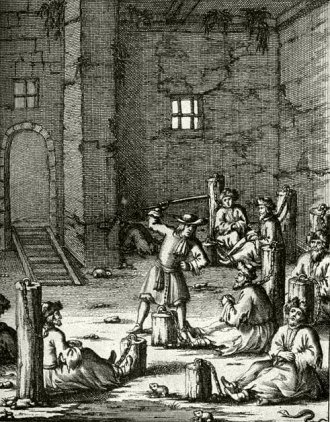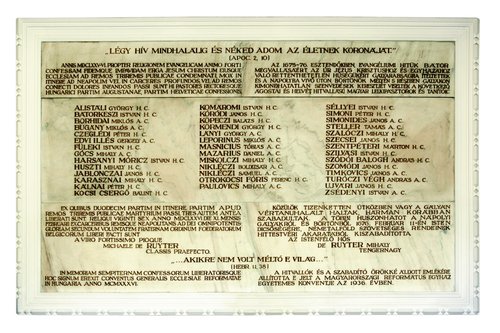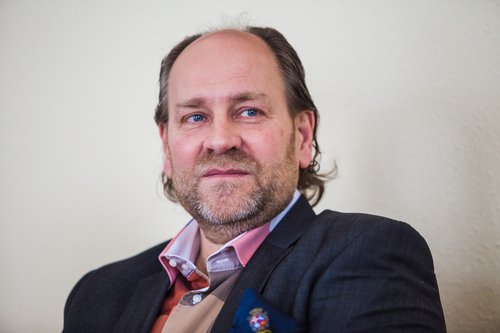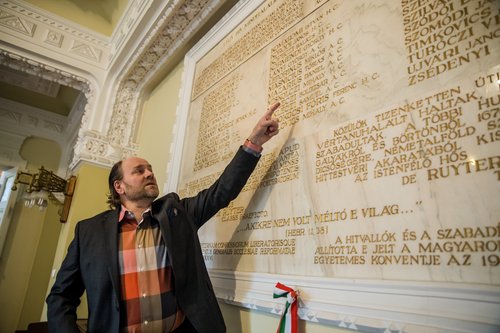On the eve of the 18th Century, all of Hungary was gradually liberated from the Turks by a pan-European alliance led by the Habsburgs. However, the liberators stayed in power, so after the 150-year-long Turkish occupation, Hungary became one of the many countries of the Habsburg Emperors. The Habsburg Emperors started to exercise their very aggressive counter-Reformation policy on the liberated territories, and, in 1673, more than 400 Protestant pastors and teachers were summoned to the imperial court in Pozsony (Bratislava). Due to their Reformed belief, they were accused of high treason and given the choice of either becoming Catholic or fleeing the country.

Protestant pastors in prison
Some of them became Catholics, many of them fled abroad, but around forty remained faithful. They were imprisoned and tortured, then forced to march to Italy where they were sold as galley slaves on the Mediterranean Sea. Only twenty-six of them survived in the galleys. The Dutch Navy, under the leadership of the faithful Admiral Michiel de Ruyter, freed them in 1676. The former prisoners were then given shelter in Switzerland, Germany, and the Netherlands.

Memorial Plaque, placed by the General Convent of RCH in year 1936
Hungarian-Dutch cultural relations date back to the 17th century when Protestant Hungarian students went to study law or theology at Dutch institutions, and the instance of the Hungarian galley slaves served to even further bond the two nations.
In remembrance of this connection between the two countries, and in celebration of the new Dutch film, The Admiral, about the life of Michiel de Ruyter, a descendent of his recently visited Hungary to pay homage to this heroic man, and his legacy that still lives on. Frits de Ruyter de Wildt is a 12th generation descendent of the Admiral Michiel de Ruyter; he pursued his own career on the sea and was a Navy officer for sixteen years, after which he entered the business world and became a successful entrepreneur. He regularly speaks about his family history and brings the stories of his ancestors to life for crowds of all ages and backgrounds.

“The common thread in his story is working together,” says Frits de Ruyter de Wildt about his ancestor. “He was able to work together with everybody. When there was a war with the English, after the battle, he drank a glass of wine with his opponent; in between the wars with the English, he had English friends. He had a Negro friend from his youth that he met again in Africa when he was older, and he was able to trade and communicate with him. He was able to communicate, as a protestant, with the Catholics. He was able to participate, communicate, and work together with everybody. That makes whatever he did more valuable, because he made his own goals and ambitions serving a higher God.”
As for Frits’ own religious background, he speaks about the joys of being brought up with a non-practicing protestant mother and a freemason father who encouraged him to learn and explore many religions from around the world. When asked if he shares the same religious convictions that the Admiral Michiel de Ruyter had, he says, “Not yet,” though he is open to the possibility. “The thing is, I’m convinced that there is something, that there must be something. This is not coincidence, but to label it with a Muslim God or a Jewish God or a protestant God or a Catholic God has not yet formed in my head – which probably means that I’m more protestant than anything!” he laughs.

The history of the galley slaves is still very much alive for those whose ancestors were liberated by the Admiral – their stories continue to intertwine as time goes on, liberator and liberated. One example of cosmic “coincidence” happened during World War II when a direct aunt of Frits de Ruyter de Wildt was impacted quite heavily by this never-ending story. Her parents were sent away to labor camps and the children were left behind and to be watched over by neighbors. At one point, a Hungarian preacher in the area stepped in and took the children into his care – and it just so happened that he was a descendent of one of the liberated preachers. Even all these years later, history is still fresh and impacting the lives of everyday people.
When he tells stories like this one, Frits comes alive, speaking with gusto and drama to bring the tale to life. “What he’s done, and the legacy he left, is useful for everyone at the moment, you just have to translate it from the past to the present […] I want to teach from the past to the present and make him useful for all generations, everywhere.” An important endeavor, indeed, given the remarkable faith and communication skills that de Ruyter possessed – something that the world at large needs more of.
On the 11th February Mr Frits de Ruyter de Wildt visited the RCH Synod Office and laid a wreath at the memorial plaque of the Hungarian galley slaves.The next day the Dutch film, The Admiral was shown at Károli University of RCH. On the occasion of the anniversary, also a relief by two Dutch artists Tonneke van Harten and Pieter C. Kok was inaugurated on Sunday in the Reformed Church in Baja. The art piece was donated by former Ambassador Gábor Szentiványi to the Reformed Community.
Article by Kearstin Bailey
Photos: reformatus.hu/András Dimény